-
 Art of Wellness Acupuncture & Traditional Chinese Medicine (TCM)11704 Wilshire Blvd, Suite 295, Los Angeles, CA, 90025
Art of Wellness Acupuncture & Traditional Chinese Medicine (TCM)11704 Wilshire Blvd, Suite 295, Los Angeles, CA, 90025
myartofwellness@gmail.com310-451-5522 Office Hours
MonClosedTue7:30 am --4 pmWed7:30 am --4 pmThu7:30 am -- 4 pmFri7:30 am -- 4 pmSat7:30 am -- 4 pmSunClosedOur office opens from Tuesdays to Saturdays 7:30 am to 4 pm, will be closed on Memorial day, Independent day, Labor day, Thanksgiving day, Christmas and New year.
-
Recent Posts
- How to Treat Rosacea With Acupuncture and TCM
- How to Treat Perioral Dermatitis With Acupuncture and TCM
- Lymphatic Drainage With Acupuncture and TCM
- How to Treat Turf Toe With Acupuncture
- How to Treat Nerve Pain With Acupuncture and TCM
- How to Treat Watery Eyes With Acupuncture and TCM
- How to Treat Ovarian Cysts With Acupuncture and TCM
- How to Treat Dystonia With Acupuncture and TCM
- Can Acupuncture Help Bad Breath?
- How to Treat Atopy with Acupuncture and TCM
- Plantar Fasciosis Treatment With Acupuncture and TCM
- How to Protect Yourself When Air Quality Is Poor
- How to Treat Spinal Headache With Acupuncture and TCM
- How to Treat Sarcoidosis With Acupuncture and TCM
- How to Treat Flu With Acupuncture and TCM
- Chinese New Year 2025 Year of the Snake
- Sign up to receive news and updates and get my free report:“The Top 10 Reasons to Try Acupuncture”

July 2025 M T W T F S S 1 2 3 4 5 6 7 8 9 10 11 12 13 14 15 16 17 18 19 20 21 22 23 24 25 26 27 28 29 30 31
Herbs
How to Treat Pelvic Congestion Syndrome With Acupuncture and TCM
By Xiaomei Cai, L.Ac., Ph.D. and Qineng Tan, L.Ac., Ph.D.
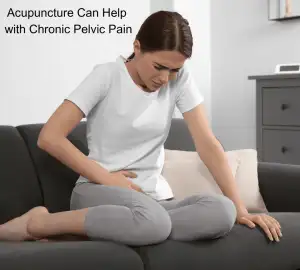
Pelvic pain that gets worse after standing for a long time? Urinary pain and urgency? Lower back pain and sciatica? Bloated stomach after eating? These can all be symptoms of pelvic congestion syndrome (PCS), or vaginal varicose veins. Acupuncture and TCM offer an alternative treatment for pelvic congestion syndrome.
What is Pelvic Congestion Syndrome (PCS)?
Pelvic Congestion Syndrome (PCS) is a chronic condition caused by varicose veins in the pelvis—similar to varicose veins that commonly occur in the legs. These dilated veins in the pelvis can cause severe pelvic pain, particularly a feeling of heaviness or aching pain that worsens over the day. PCS pain can often get worse after standing for long periods.
Pelvic congestion is one of the most common causes of chronic pelvic pain, but PCS often goes undiagnosed because the symptoms can mimic other conditions, such as:
- Endometriosis
- uterine fibroids/leiomyoma of the uterus
- bladder pain/interstitial cystitis
- ovarian cysts
- Generalized back pain, lower back pain, hip pain, or groin pain
All of these conditions can cause chronic pain in the pelvic area.
In Pelvic Congestion Syndrome, dilated veins around the ovaries and the vulvovaginal can happen due to venous obstruction, problems with valves in the blood vessels, and/or changes in hormone levels.
PCS does not only affect women. Men can also suffer from pelvic congestion syndrome and experience chronic pelvic pain.
Pelvic pain conditions related to vascular issues and blood flow are complicated. Most health conditions related to pelvic pain in relation to reproductive organs, and in particular CPS, are still not very well understood by modern medicine.
TCM offers a holistic approach to reproductive healthcare. Acupuncture treatment can help address the many factors involved in pelvic congestion syndrome.
Top 10 Pelvic Congestion Syndrome Symptoms
PCS symptoms can vary from patient to patient, but the most common signs of PCS include:
- Pelvic pain that gets worse as the day goes on. Discomfort tends to accumulate as the day progresses due to the pooling of blood in the pelvic veins, leading to increased pressure.
- Pelvic pain that worsens when standing for long periods. Many women report that standing for extended periods increases the feeling of pressure and pain in the pelvic region.
- Pelvic pain after eating, abdominal pain after meals. Eating can trigger pain and bloating, making meals uncomfortable.
- Urinary incontinence, an inability to control urination, especially when coughing or lifting something heavy.
- Painful urination (urinary pain),burning during urination, often confused with a UTI (urinary tract infection).
- Urinary urgency, sudden need to urinate, sudden, intense urge to urinate, which can feel similar to bladder conditions.
- IBS symptoms, alternating constipation and diarrhea, bloating, and abdominal pain.
- Lower back pain, radiating pain in the lower back, often mistaken for sciatica or musculoskeletal problems.
- Throbbing in the legs, achy legs after standing for a long time, poor circulation in the lower extremities, causing aching, swelling, and throbbing in the legs.
- Painful intercourse (dyspareunia), pain during or after sex due to the increased pressure and swelling of the pelvic veins.
What Does Pelvic Congestion Pain Feel Like?
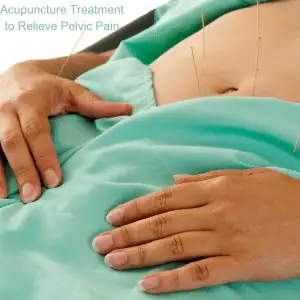
Pelvic Congestion Syndrome (PCS) and Chronic Pelvic Pain Syndrome (CPPS) are two conditions that cause debilitating pain in the pelvic region, yet they are distinct in the way they present.
Pelvic Congestion Syndrome (PCS) is primarily caused by varicose veins in the pelvis, leading to blood pooling in the veins and creating chronic pelvic pain, particularly in women of childbearing age. PCS pain tends to worsen after long periods of standing, physical activity, or after sexual intercourse.
PCS is often associated with hormonal changes and pregnancy, but it is also underdiagnosed because the symptoms can overlap with other pelvic disorders besides pregnancy.
Diagnostic tools like Doppler ultrasound or venography are often needed to identify the underlying venous issues, which may be treated with hormone therapy, vein embolization, or surgery.
Medications that suppress estrogen may be prescribed to help relieve symptoms. These include Depo-Provera, Implanon, or Goserelin. These are all drugs that also prevent pregnancy, so they are not helpful for people who may be hoping to get pregnant, or who want or need to avoid taking hormonal birth control for whatever reason.
Ovarian vein embolization is a procedure that blocks or ties off veins so that blood isn’t flowing or pooling in areas of the pelvis.
Acupuncture offers an natural treatment for pelvic congestion syndrome, without side effects of hormonal birth control.
Can Acupuncture Help Pelvic Congestion Syndrome?
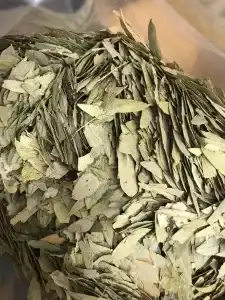
Traditional Chinese Medicine (TCM), particularly acupuncture, can be an effective modality for treating conditions like Pelvic Congestion Syndrome (PCS) and Chronic Pelvic Pain Syndrome (CPPS).
Acupuncture has been widely adopted in both Eastern and Western countries for managing pain syndromes. The central mechanism behind acupuncture’s effectiveness in these cases is its ability to stimulate specific acupoints, improving local blood circulation and reducing inflammation, which ultimately helps in alleviating pain.
The muscles and fascia inside the pelvis play a crucial role in maintaining the stability of the pelvis and spine. The fascia in the pelvis can be compromised by trauma, postural stress, pregnancy, anxiety, and other subtle factors.
This is one of the reasons the pelvic pain and congestion can be difficult for conventional medicine to address properly. Visceral pain in the pelvic may not be easily “visible,” as it can be caused by microtraumas, adhesions, scar tissue, and pain referring from one area to another.
Acupuncture treatment can help relieve this type of pain, as placing needles in acupoints has an analgesic, as well as a calming, effect.
Research has demonstrated that acupuncture can release certain neurochemicals like adenosine, which exerts an analgesic effect during stimulation of acupoints, offering relief from pain in conditions like CPPS. This mechanism helps reduce inflammation and regulate pain by influencing inflammatory mediators, which play a significant role in chronic pelvic pain disorders.
Clinical trials have specifically shown that acupuncture improves symptoms in both men and women suffering from CPPS, with better outcomes than placebo or sham treatments.
One study looked at male patients with pelvic pain and venous congestion. After five weekly sessions of acupuncture treatment, patients reported significant reduction in pain, and MR venography showed reduction in intrapelvic venous congestion.
Specific formulations of Chinese herbs have been developed to help address the root cause of pelvic congestion, while also relieving painful symptoms.
Acupuncture’s ability to relieve pain through modulation of inflammatory processes makes it an excellent alternative or complementary therapy for chronic pelvic pain conditions.
Acupuncture Near Me for PCS in West LA
At Art of Wellness Acupuncture and TCM in Santa Monica, we have over 35 years of experience helping people with all kinds of chronic pain conditions. We offer highly specialized care for people experiencing reproductive issues, pregnancy, pelvic pain, referred back pain, lower back pain, hip pain, and groin pain. Our team of practitioners spend time with each patient to provide holistic care that takes the whole person into account: physical, mental, and emotional. If you or someone you know is experiencing chronic pelvic pain, please do not hesitate to reach out to us.
*This article is for education from the perspective of Traditional Chinese Medicine only. The education provided by this article is not approved by FDA to diagnose, prevent, treat and cure human diseases. It should not stop you from consulting with your physician for your medical conditions. Traditional Chinese Medicine is based on Qi, which is an invisible force that usually cannot be observed by modern science. Because science focuses on testing ideas about the natural world with evidence obtained through observation, these aspects of acupuncture can’t be studied by science. Therefore acupuncture and Chinese herbs are often not supported by double-blind, randomized trials, and they are considered alternative medicine therapies in the United States.
How to Treat Edema With Acupuncture and TCM
By Qineng Tan, L.Ac., Ph.D. and Xiaomei Cai, L.Ac., Ph.D.

Swollen feet and ankles? Fluid retention in legs? These are signs of edema. Acupuncture and TCM offer natural diuretic herbs and alternative treatment for swelling in legs and feet.
Edema refers to when excess fluid in body tissues, or water retention, leads to swelling. Edema most commonly causes swollen ankles and swollen feet. But edema can occur in many parts of the body.
Blood vessels have tiny valves that work to push blood from the lower body back up to the heart. When this process isn’t working properly, blood and other fluids will gather in the legs and cause swollen feet and ankles.
Edema causes puffiness under the skin, and when you press on the skin, it leaves an imprint. The skin may be shiny and stretched because of water retention.
Other edema symptoms can include a feeling of heaviness in the legs, and a swollen belly or distended abdomen.
Everyone experiences edema once in a while; for example, after a long airplane flight, which causes fluids to pool in the legs and feet, or the day after eating particularly salty foods, which can cause water retention. Edema is also common during pregnancy, when increased blood volume and pressure from the growing uterus can cause edema in the legs.
Occasional edema can often be prevented or remedied by reducing salt intake, drinking more water, and wearing compression garments.
Some health conditions can cause edema, in which case, both the underlying issue and the edema itself need to be addressed.
Acupuncture and Chinese herbs can help relieve swollen ankles and feet due to water retention, as well as helping to address the root cause of edema.
Causes of Edema
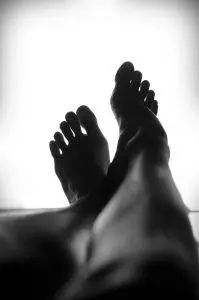
Edema can happen when a person stays in one position for a long time and fluids build up in the lower body due to gravity. This type of swelling can be helped by getting up and moving around regularly and/or wearing compression socks that prevent water retention from causing swollen ankles and feet.
Cardiovascular issues having to do with heart function or the health of blood vessels can cause edema. When the heart doesn’t pump blood effectively, it can cause fluid buildup in the legs, ankles, and feet. Venous insufficiency, or weakness in the veins, can prevent blood from being pushed back to the heart properly, which leads to varicose veins and blood buildup in the legs.
Kidney disease and liver disease can contribute to edema. Damaged kidneys are less able to remove excess fluid, leading to swelling. Conditions like cirrhosis can increase pressure in blood vessels and reduce proteins that keep fluid in the bloodstream, causing edema.
Blocked or damaged lymph nodes can prevent lymph fluid from draining well, causing localized edema. This is known as lymphedema. Lymphedema can be related to cancer treatments, when lymph nodes are removed.
People may experience edema after a stroke or cardiac event like a heart attack.
Side effects from some drugs, including those for high blood pressure and corticosteroids, can cause fluid retention.
Conditions such as cellulitis or arthritis can cause inflammation and localized swelling.
When there are underlying conditions like cirrhosis, kidney problems, and vascular issues, they must be addressed in order to resolve the edema.
Treatment for Swollen Legs and Feet
Conventional medical treatments for edema typically focus on addressing the underlying cause and managing symptoms. Typical medical treatment for edema may include:
- Diuretics to help the body expel excess fluid through urine.
- Compression stockings to help reduce swelling by promoting fluid movement in the legs.
- Elevating the affected limbs above the level of the heart can help reduce swelling.
- Lowering sodium in the diet can help prevent fluid retention.
- Regular exercise to improve circulation and help reduce swelling.
- Addressing heart, kidney, or liver issues can help manage edema.
Using diuretic medications may seem to alleviate swelling in the short term, but these drugs create a kind of dependency. As soon as a person stops taking the diuretics, the water retention will return.
Chinese herbal formulations can act as natural diuretics, while addressing the root cause of edema.
By integrating acupuncture and TCM into your treatment plan, you may find a holistic approach that addresses not only the symptoms of edema but also its cause, providing lasting relief from edema swelling.
Can Acupuncture Help Edema?
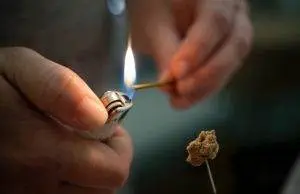
TCM theory for the treatment of edema goes back over 2000 years. The Yellow Emperor wrote about edema treatment in his medical text before 100 B.C., describing the disruption of fluid movement in the body. In the second century A.D., another well-known Chinese doctor Zhang Zhong-Jing detailed treatments for edema with herb formulas, which are still considered classics today.
Edema can be related to imbalances in Yin and Yang. Yin edema affects the spleen and kidneys, while Yang edema affects the spleen and lungs. Yin edema symptoms tend to start in the lower body, with swollen feet and ankles, while Yang edema symptoms tend to start in the upper body, with the tendency to have tight, shiny skin.
According to TCM, the organ systems of the Spleen, Kidneys, and Lungs must be balanced in order to restore proper functioning of fluid metabolism. An acupuncture treatment protocol would be directed towards clearing wind, heat, dampness, and other pathogenic forces, while balancing Yin and Yang, and regulating Qi and Blood.
Different pathologies of edema can be described by TCM diagnoses, including:
- Blood stasis
- Qi stagnation
- Damp heat
- Heat toxins
- Wind-cold or Wind-heat in the lungs
Recent research shows that ancient herb formulas can help regulate fluids and have a positive effect on vascular function.
Moxibustion, a TCM modality that involves warming acupoint areas by burning mugwort herb near the skin, is often used to help relieve edema. Moxa treatment can help improve blood flow by warming and dispersing dampness and phlegm and invigorating the spleen and kidneys.
One study of patients suffering from swelling in legs and ankles showed that moxibustion helped relieve swelling in the legs.
Breast cancer treatment often involves radiation treatment that affects the lymph nodes, or the removal of lymph nodes, which can lead to lymphedema. This type of lymphedema often affects one arm, or both arms. It can also affect other parts of the body.
One study involved using acupuncture treatment twice a week to help relieve lymphedema after cancer treatment. More than half of the patients experienced a significant improvement in lymphedema, as measured by arm circumference. The conclusion was that acupuncture is a safe treatment that can help reduce swelling.
Acupuncture treatment improves blood flow and the movement of fluids in general, while nourishing the kidneys and spleen. Moxibustion can be used to further stimulate the flow of blood and Qi.
Acupuncture Near Me for Edema in West Los Angeles
Edema is a common problem, but it requires an individualized approach, as it can have many different root causes. Experienced acupuncture practitioners like Dr. Tan and Dr. Cai at Art of Wellness in Westwood, CA can help patients find relief from edema swelling and water retention in legs through a combination of acupuncture, moxa, herbs, and personalized nutrition counseling.
*This article is for education from the perspective of Traditional Chinese Medicine only. The education provided by this article is not approved by FDA to diagnose, prevent, treat and cure human diseases. It should not stop you from consulting with your physician for your medical conditions. Traditional Chinese Medicine is based on Qi, which is an invisible force that usually cannot be observed by modern science. Because science focuses on testing ideas about the natural world with evidence obtained through observation, these aspects of acupuncture can’t be studied by science. Therefore acupuncture and Chinese herbs are often not supported by double-blind, randomized trials, and they are considered alternative medicine therapies in the United States.
How to Treat SIBO With Acupuncture and TCM
by Qineng Tan, L.Ac., Ph.D. and Xiaomei Cai, L.Ac., Ph.D.

Abdominal pain, bloating, diarrhea? These can be SIBO symptoms. SIBO, or small intestinal bacterial overgrowth, can cause bloated stomach, abdominal cramps and pain. Acupuncture and TCM can offer alternative SIBO treatment and bloating relief.
Small Intestinal Bacterial Overgrowth (SIBO) is a condition in which an abnormal increase in the population of bacteria occurs in the small intestine.
Unlike the large intestine, which is rich in bacterial flora essential for digestion and immune function, the small intestine typically contains relatively few bacteria. When these bacteria proliferate excessively in the small intestine, they can disrupt normal digestion and nutrient absorption, leading to a variety of uncomfortable and sometimes debilitating symptoms.
Problems with gut motility also contribute to SIBO symptoms. Peristalsis is the process by which the smooth muscle tissues in the intestine move food matter through the gastrointestinal tract. When peristalsis isn’t happening the way it should, this is known as dysmotility. This can lead to stagnation of food matter in the intestine, which allows for an overgrowth of bacteria to build up. This in turn can causes hydrogen and methane gas to be produced by the fermentation of carbohydrates that are stagnant in the small intestine. This excess gas causes painful bloating and distension of the abdomen.
SIBO can cause a range of digestive symptoms, such as bloated stomach, abdominal pain, diarrhea, constipation, and malabsorption of nutrients from food, which can result in unwanted weight loss and nutritional deficiencies. Vitamin B12 deficiency is particularly common among people suffering from SIBO.
Other symptoms, seemingly unrelated to the gastrointestinal system, can include: fatigue, headache, low fever, and rosacea.
SIBO is often associated with other health issues, including irritable bowel syndrome (IBS), celiac disease, and diabetes.
Acupuncture and TCM can work as an adjunct or alternative treatment for SIBO symptoms.
This can lead to hydrogen and methane gas being produced by the fermentation of carbohydrates that are stagnant in the small intestine. This excess gas can cause painful bloating and a distended abdomen.
What Causes SIBO?
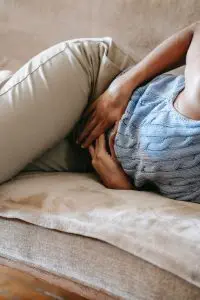
A wide variety of different issues can play a role in the development of SIBO. Many conditions may cause problems with the secretion of gastric acids, with motility of the small intestine, gut immune function, and structural issues related to surgeries, injuries, or other abnormalities of the intestine.
Conditions that may contribute to SIBO include:
- Gastroparesis due to diabetes, or connective tissue disorders, viral infection, or ischemia
- Cirrhosis
- Chronic renal failure
- Scleroderma
- Crohn’s disease
- Celiac disease
- Recurrent rounds of antibiotics
- Excessive consumption of alcohol
- GI tract surgeries that create structural abnormalities
- Immune deficiencies of T-cell or antibody responses
What’s the Difference Between IBS and SIBO?
Symptoms of SIBO are very similar to IBS symptoms, and it is possible for a person to have both IBS and SIBO at the same time. The difference between SIBO and irritable bowel syndrome is that IBS is a functional syndrome stemming from issues in the large intestine, whereas SIBO occurs in the small intestine.
One review of studies showed that the incidence of SIBO among patients with IBS is much higher than among people who don’t have IBS symptoms. The exact link between IBS and SIBO has not yet been clarified by medical science.
Medical Treatment for SIBO
In Western medicine, the treatment of SIBO typically involves a multi-faceted approach aimed at reducing the bacterial overgrowth, addressing the underlying causes, and managing symptoms.
Along with trying to find and address any underlying conditions that may be causing or contributing to SIBO, the mainstays of conventional treatment include antibiotics and medications to help improve gut motility.
The primary treatment for SIBO is the use of antibiotics to reduce the bacterial load in the small intestine. Commonly prescribed antibiotics include rifaximin, metronidazole, and ciprofloxacin. These antibiotics are chosen for their ability to target the small intestine bacteria while minimizing disruption to the rest of the gut microbiota.
Unfortunately, while antibiotics may help reduce bacteria, but they can also come with unwanted side effects. Rifaximin can cause bladder pain, urinary frequency, difficulty urinating, and cloudy urine. It can also contribute to feelings of anxiety, dizziness, headaches, fast breathing, fast heartbeat, and problems sleeping.
Antibiotics do not necessarily ease symptoms like gas and bloating, and can cause constipation and black, tarry stool.
Prokinetics are medications that help improve gut motility, ensuring that food and bacteria move efficiently through the digestive tract, which can help prevent bacterial stasis and overgrowth. Common prokinetics include erythromycin in low doses, prucalopride, and metoclopramide.
Dietary modifications will usually be recommended to help manage SIBO. Patients are often advised to follow specific diets such as the low FODMAP diet, which reduces the intake of fermentable carbohydrates that can feed bacterial overgrowth. Other dietary approaches may include the Specific Carbohydrate Diet (SCD) or an elemental diet, which involves consuming easily digestible, nutrient-rich formulas.
It can be difficult for people to follow a SIBO diet, and many physicians are not able to spend the time with patients that is required to properly support these behavioral changes. Without dietary support, the antibiotics and prokinetics may not do enough to get rid of SIBO.
Successful treatment of SIBO often requires addressing any underlying conditions that contribute to bacterial overgrowth. This could involve treating gastrointestinal motility disorders, managing chronic pancreatitis, or addressing structural abnormalities such as strictures or diverticula.
By understanding the underlying causes and employing a comprehensive treatment strategy, conventional medicine aims to alleviate symptoms and reduce the recurrence of SIBO. However, due to the chronic nature of the condition and the complexity of the gut microbiome, many patients seek complementary treatments such as acupuncture and herbal medicine to support their overall gut health and enhance the effectiveness of their treatment plan.
Can Acupuncture Help SIBO?
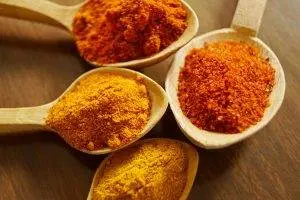
Chinese herbal medicine has its own way of helping to relieve SIBO, improve motility and digestion, and soothe uncomfortable stomach pain and bloating.
TCM theory views stagnation of Qi and blood as being one of the primary pathogenic forces in the body that causes pain and disease. In the case of SIBO, weakness or stagnation of organ systems, such as the stomach, liver, and spleen, is often part of the diagnostic pattern.
Diet, herbs, and supplements may all play an important role, in addition to acupuncture treatment for SIBO. Digestive enzymes and/or probiotics may be helpful in some cases. It may be necessary to eliminate some foods for a time to help control excessive fermentation and bacterial proliferation that is causing the gas and bloating.
There are foods and herbs that can work as natural prokinetics, to help improve gut motility and aid in proper absorption of nutrients. Ginger, turmeric, and peppermint oil are a few easy-to-find products that can help with digestion. There are also classic Chinese herbal preparations that can work even better than pharmaceutical prokinetics to help relieve constipation and indigestion.
A review of trials in China using Modified Runchang-Tang (MRCT) showed that in a sampling of over 2000 patients, this herbal formula worked better than conventional laxatives for relieving constipation.
Another review found that Modified Chaihu Shugan powder (MCSP) worked better than chemical prokinetics to help resolve symptoms of dyspepsia, or indigestion.
In addition to specific Chinese herb formulas that can help relieve digestive issues and work to get rid of unhealthy bacteria, there are other well-known common herbs that can also be helpful:
- Black cumin
- Garlic
- Cloves
- Cinnamon
- Thyme
- All-spice
- Bay leaves
- Mustard
- Rosemary
Acupuncture practitioners have generally received much more specialized training in nutrition than conventional doctors. Your acupuncturist will be able to make dietary recommendations that are specific to your symptoms and condition.
Acupuncture for SIBO Near Me in Los Angeles
Dr. Tan and Dr. Cai at Art of Wellness in West Los Angeles/Santa Monica have over 30 years of experience helping people with all types of gastrointestinal disorders. You do not have to suffer with gas pain and bloating, constipation or persistent diarrhea. Try Chinese medicine as an alternative or adjunct treatment for SIBO and IBS.
*This article is for education from the perspective of Traditional Chinese Medicine only. The education provided by this article is not approved by FDA to diagnose, prevent, treat and cure human diseases. It should not stop you from consulting with your physician for your medical conditions. Traditional Chinese Medicine is based on Qi, which is an invisible force that usually cannot be observed by modern science. Because science focuses on testing ideas about the natural world with evidence obtained through observation, these aspects of acupuncture can’t be studied by science. Therefore acupuncture and Chinese herbs are often not supported by double-blind, randomized trials, and they are considered alternative medicine therapies in the United States.
How to Treat Scleroderma With Acupuncture and TCM
By Xiaomei Cai, L.Ac., Ph.D. and Qineng Tan, L.Ac., Ph.D.
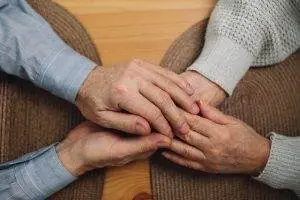
Hard, thickening, tight skin? Itchy, dry skin that is shiny? Changing skin color? These could be symptoms of scleroderma, an autoimmune disorder that causes your body to produce too much collagen. Acupuncture and TCM treatment can help relieve inflammation and pain while helping to resolve the underlying cause of scleroderma.
Scleroderma can be considered a type of dermatosis (skin lesion), and also a type of connective tissue disease (negatively impacting tissues that connect structures in the body), as it usually affects skin and cartilage, often starting in the extremities, and then extending up the limbs towards the trunk.
Collagen is a form of fibrous protein that the body produces to maintain the structure of skin cells, muscles, bones, and connective tissue. The immune system triggers collagen production when we are injured, but in the case of scleroderma, the body is overproducing and accumulating too much collagen.
Localized scleroderma affects primarily the skin tissue, but can also spread to subcutaneous tissues, like fascia and muscles.
In some cases, scleroderma can also impact internal organs, like the esophagus, lungs, heart, and kidneys. This is known as systemic scleroderma.
Top 3 Types of Scleroderma
Localized scleroderma can be differentiated into 3 types:
- Localized scleroderma – a few patches of discolored skin (circumscribed morphea); these skin lesions can vary in size, may be oval shaped, and are usually yellow in the center with a red border.
- Generalized scleroderma – also called generalized morphea, with this type there are more patches of thick, hard skin on various parts of the body, which may overlap.
- Linear scleroderma – more common in children, may show up as one band of affected skin on a limb or on the trunk, with a few patches of morphea. Linear scleroderma on arms and legs may affect the growth and development of that limb, as scleroderma may impact the muscle and bone tissues as well as the skin.
Systemic scleroderma is rare, but happens more commonly in women between the ages of 30 and 50. This type of scleroderma can manifest in different ways.
Systemic scleroderma can sometimes first show up as Raynaud’s phenomenon, or Raynaud’s syndrome, in which the blood vessels in the hands and feet close up when the weather is cold and cause color changes to the skin, as well as sensations of numbness, prickling, tingling, or pain. Stress can also trigger Raynaud’s.
Systemic scleroderma can cause scarring on the skin and internal organs, which can lead to gastrointestinal problems like acid reflux, cardiovascular and pulmonary problems, or renal disease.
Acupuncture treatment can be used as an adjunct treatment to help relieve symptoms of pain related to skin hardening, as well as helping to alleviate heartburn and GERD type symptoms in patients with esophageal symptoms of scleroderma. TCM can also help address the root causes of scleroderma and other autoimmune disorders.
What Causes Scleroderma?
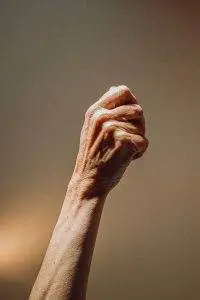
As with most autoimmune disorders, medical science has not yet discovered exactly why some people develop this condition. While it is not passed from parent to child the way genetic diseases are, you are more likely to have scleroderma if someone else in your immediate family has it, too.
It is believed that factors like environmental toxins and/or viral infections can trigger scleroderma symptoms to flare up. The overproduction of collagen is due to abnormal functioning of the immune system.
Because women develop scleroderma more often than men do, it may be that there is a hormonal factor that affects the disease, as well.
Diagnosis and Medical Treatment for Scleroderma
There is no cure for scleroderma, so conventional medical treatments aim to alleviate symptoms and slow down the progression of the disease. The treatment plan may vary depending on the specific manifestations and severity of the disease.
To diagnose scleroderma, doctors rely on a combination of clinical assessments, medical history review, physical examinations, and lab tests. A doctor will first observe skin changes, such as thickening and hardening, then look for internal organ involvement and other symptoms.
Blood tests can help identify specific antibodies associated with scleroderma, such as antinuclear antibodies (ANA), anti-centromere antibodies (ACA), and anti-Scl-70 (anti-topoisomerase I) antibodies. Additionally, blood tests can assess organ function, including kidney and liver function, as well as inflammatory markers.
X-rays, ultrasound, or CT scans may be used to evaluate internal organ involvement, such as lung fibrosis, gastrointestinal complications, and cardiac abnormalities.
A skin biopsy sample may be taken to confirm the presence of fibrosis and assess the degree of inflammation.

Medications that may be recommended for treating scleroderma symptoms include:
- Immunosuppressants: Medications such as methotrexate, mycophenolate mofetil, and azathioprine may be prescribed to suppress the immune response and reduce inflammation.
- Corticosteroids: Oral or topical corticosteroids can help manage inflammation and alleviate symptoms in certain cases. However, long-term use may have potential side effects and is usually minimized.
- Vasodilators: Medications like calcium channel blockers and prostacyclin analogs may be prescribed to improve blood flow and manage Raynaud’s phenomenon.
- Proton pump inhibitors (PPIs): These medications can help manage gastroesophageal reflux disease (GERD) symptoms, which are common in scleroderma patients.
Patients are often advised to make lifestyle changes to manage their condition effectively. These may include:using skin moisturizers and avoiding excessive sun exposure, and using sunscreen with a high SPF, avoiding cold temperatures and stress to prevent triggering Raynaud’s, quitting smoking, and eating an anti-inflammatory diet.
Can Acupuncture Help Scleroderma?
TCM treatment for scleroderma focuses more on addressing the underlying causes of the condition, rather than simply trying to relieve symptoms. An acupuncturist will look closely at the whole person, listen carefully to hear all the symptoms they are experiencing, even those which may seem unrelated, feel their pulse and make other observations, and then ascertain which diagnostic pattern may apply.
According to TCM theory, scleroderma symptoms may occur due to:
- Blood stagnation
- Yang deficiency
- Kidney Qi deficiency or yang deficiency
- Liver and Gallbladder damp heat
- Liver blood deficiency
- Liver win
- Spleen yang deficiency
- Stagnation of cold, wind, and/or damp
Depending on the diagnosis, the TCM practitioner will then plan a treatment protocol to address the root cause, using acupuncture and herbs. For example, herbs can help move stagnant blood, relieving the skin conditions related to scleroderma. Herbs can even help to inhibit collagen production, to help reduce skin hardening.
Acupuncture has been shown to help reduce the number of Raynaud’s attacks.
Moxibustion treatment may also be used to help relieve symptoms related to Raynaud’s phenomenon.
The use of acupuncture for stress relief is also integral to treatment for scleroderma, as stress can trigger a worsening of symptoms.
Acupuncture can help reduce esophageal reflux in cases where esophageal strictures have developed due to scleroderma in the digestive tract and help improve kidney function when kidneys have been impacted by fibrosis.
TCM herbal formulations for scleroderma will be individualized for each patient’s needs. Herbs may be used to help warm and nourish the organs, while clearing dampness and activating stagnant blood and Qi.
Acupuncture Near Me for Scleroderma in Los Angeles
Acupuncture and TCM herbal medicine can be excellent modalities for helping with difficult to treat skin conditions, connective tissue disorders, and autoimmune disorders, including:
- Dermatitis
- Eczema
- Psoriasis
- Vitiligo
- Rheumatoid Arthritis
- Lupus
- Herpes simplex
- Hives, urticaria
- Ehlers-Danlos syndrome (EDS)
If you are experiencing painful skin problems or digestive problems, consider seeking out alternative care in addition to conventional treatments.
*This article is for education from the perspective of Traditional Chinese Medicine only. The education provided by this article is not approved by FDA to diagnose, prevent, treat and cure human diseases. It should not stop you from consulting with your physician for your medical conditions. Traditional Chinese Medicine is based on Qi, which is an invisible force that usually cannot be observed by modern science. Because science focuses on testing ideas about the natural world with evidence obtained through observation, these aspects of acupuncture can’t be studied by science. Therefore acupuncture and Chinese herbs are often not supported by double-blind, randomized trials, and they are considered alternative medicine therapies in the United States.
How to Treat Gallbladder Pain With Acupuncture and TCM
By Qineng Tan, L.Ac., Ph.D. and Xiaomei Cai, L.Ac., Ph.D.

Pain on right side abdomen? Sudden, sharp right abdomen pain? This could be a sign of a gallstone or gallbladder issue. Gallbladder attacks can cause severe gallbladder pain. Acupuncture and TCM can provide an alternative or adjunct treatment for gallstones symptoms.
The gallbladder is a small organ located on the right side of your abdomen, under the liver. The liver produces bile, a liquid that helps break down fats into fatty acids. The gallbladder stores bile and releases it into the small intestine as needed, to help with digestion.
When the bile that your body produces has too much cholesterol or bilirubin in it, or when bile is not draining out of the gallbladder properly, it can become too concentrated and begin to harden into a solid.
Gallbladder pain usually occurs because a person has gallstones, which are just what they sound like: little stones that develop inside the gallbladder and are made up mostly of cholesterol. The medical term for gallstones is “cholilithiasis.”
Many people have gallstones and are not aware of it. It is possible to have gallstones with no symptoms at all.
Top 5 Gallstone Symptoms
People who have gallbladder disease or gallstones are likely to experience a condition known as “biliary colic.” This means that they have an intolerance for fatty foods and may experience dyspepsia, nausea, and/or bloating when they eat something that disagrees with them.
Severe, sharp right side stomach pain is the most common sign of a gallbladder attack, which is when a gallstone becomes lodged in one of the small tubes or ducts that lead to and from the liver, gallbladder, and pancreas.
Gallbladder symptoms may include:
- Pain in lower right abdomen
- Nausea and/or vomiting
- Yellow skin and/or yellow eyes, jaundice
- Fever and/or chills
- Brown pee, brown urine, light-colored poop
Sometimes gallbladder pain can refer to the right shoulder, or between the shoulderblades.
Gallbladder pain can also happen due to inflammation of the gallbladder. This condition is known as cholecystitis and occurs when a gallstone blocks the duct that leads out of the bladder, causing bile and bacteria to build up and become infected.
Stones can sometimes become lodged in the common bile duct, which not only causes pain, but can lead to pancreatitis. Gallstones are the primary cause of acute pancreatitis, in which the pancreas becomes irritated and inflamed due to a backup of bile and/or digestive enzymes.
The pain of a gallbladder attack is unignorable. If it doesn’t go away within a few hours, most people choose to go to the emergency room for urgent care.
Gallstones may pass on their own, or drugs are sometimes used to help dissolve the gallstones. These drugs can be expensive, and sometimes cause problems like atherosclerosis, or fatty buildup in the arteries.
When gallstone pain comes and goes, and the gallstones are present but not causing the blockage of a duct, usually pain management and patience are the only treatment.
If gallbladder issues keep coming up, the typical medical treatment is gallbladder surgery.
Acupuncture can offer an alternative treatment to help relieve gallbladder pain. TCM is considered an effective treatment for biliary colic due to gallbladder disease.
Gallbladder Removal
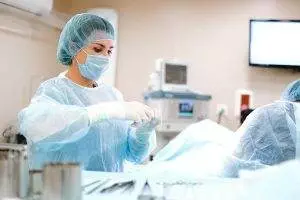
It is very common for people presenting with acute pancreatitis or a gallbladder attack to have a cholecystectomy, or gallbladder removal. Over 300,000 cholecystectomies are performed in the U.S. each year.
While this gallbladder surgery is usually done laparoscopically and is minimally invasive, there are disadvantages to living without a gallbladder.
Some people have what is known as postcholecystectomy syndrome, in which they continue to experience pain on right side abdomen, heartburn, nausea, indigestion, and vomiting, even though their gallbladder is gone.
Some research studies have suggested that gallbladder removal may not be necessary or desirable for everyone. It may be worth considering alternative or adjunct gallbladder pain treatment with TCM and acupuncture.
Can Acupuncture Help Gallbladder Symptoms?
Chinese medicine has been used to treat gallstones for thousands of years, without surgery.
According to TCM theory, the gallbladder is the Yang organ that ideally works cooperatively and in harmony with the Yin liver. The gallbladder is an extraordinary organ in that it is part of the digestive system, but it never comes in direct contact with the food you eat. It stores and secretes bile to help break down fats.
In TCM, we consider the gallbladder to represent the part of our nature that makes decisions, takes action, and feels inspired. When the liver and the gallbladder are not functioning smoothly, we may feel frustrated, angry, and depressed. Repressing anger can exacerbate gallbladder problems, as can eating the wrong foods.

In TCM, the gallbladder is associated with spring, and the wood element. It is best nourished with lots of dark, leafy greens, herbs, roots, and green tea. Eating too many fatty, fried foods, and drinking too much alcohol can have a very negative effect on both the liver and gallbladder.
The stimulation of acupoints along the gallbladder meridian can help to regulate the sphincters of the gallbladder and its action, and help to promote the secretion of bile so that it does not remain stagnant inside the gallbladder.
Acupuncture can also have an analgesic effect that may even be superior to that of NSAIDs pain relief medications, without any of the side effects that may occur with regular use of these drugs.
Acupuncture can also be used to treat chronic cholecystitis, the chronic inflammation of the gallbladder due to infection. TCM treatment can help reduce inflammation and improve immune function so that infections can be more easily fought off.
Acupuncture and TCM can also be used as an adjunct treatment to help boost the efficacy of conventional medications. One study showed that patients who were given cefodizime for chronic cholecystitis and also received acupuncture had a 98% effective rate, as opposed to patients who received the medication only, who had only a 50% effective rate.
There are many Chinese herb preparations designed to help with gallstones. These formulas are based on TCM theories related to clearing the stagnation of Qi and blood in the liver and gallbladder, removing dampness and heat and treating yin deficiency.
These herbs have been shown to help discharge gallstones, control the metabolism of bilirubin, and help to prevent the formation of new stones in the future.
Acupuncture Near Me for Gallbladder Pain in West Los Angeles
Acupuncture and TCM can provide natural treatments for gallstones and many other problems related to the digestive system, such as diarrhea, constipation, Crohn’s disease, colitis, IBS, diverticulitis, and celiac disease. If you are experiencing abdominal pain and other digestive symptoms, consider consulting with a TCM practitioner. Acupuncture can help prevent conditions like gallstones from getting worse.
*This article is for education from the perspective of Traditional Chinese Medicine only. The education provided by this article is not approved by FDA to diagnose, prevent, treat and cure human diseases. It should not stop you from consulting with your physician for your medical conditions. Traditional Chinese Medicine is based on Qi, which is an invisible force that usually cannot be observed by modern science. Because science focuses on testing ideas about the natural world with evidence obtained through observation, these aspects of acupuncture can’t be studied by science. Therefore acupuncture and Chinese herbs are often not supported by double-blind, randomized trials, and they are considered alternative medicine therapies in the United States.